Azerbaijan, Belarus, and Pakistan strengthen ties Meeting on the SCO sidelines
Many media outlets circulated a photograph taken on the sidelines of the Shanghai Cooperation Organisation (SCO) summit in the Chinese city of Tianjin, showing Azerbaijani President Ilham Aliyev and Belarusian President Alexander Lukashenko smiling as they converse.
A meeting in the spirit of cooperation
Also present at this meeting between the Azerbaijani and Belarusian presidents was Pakistani Prime Minister Shehbaz Sharif.
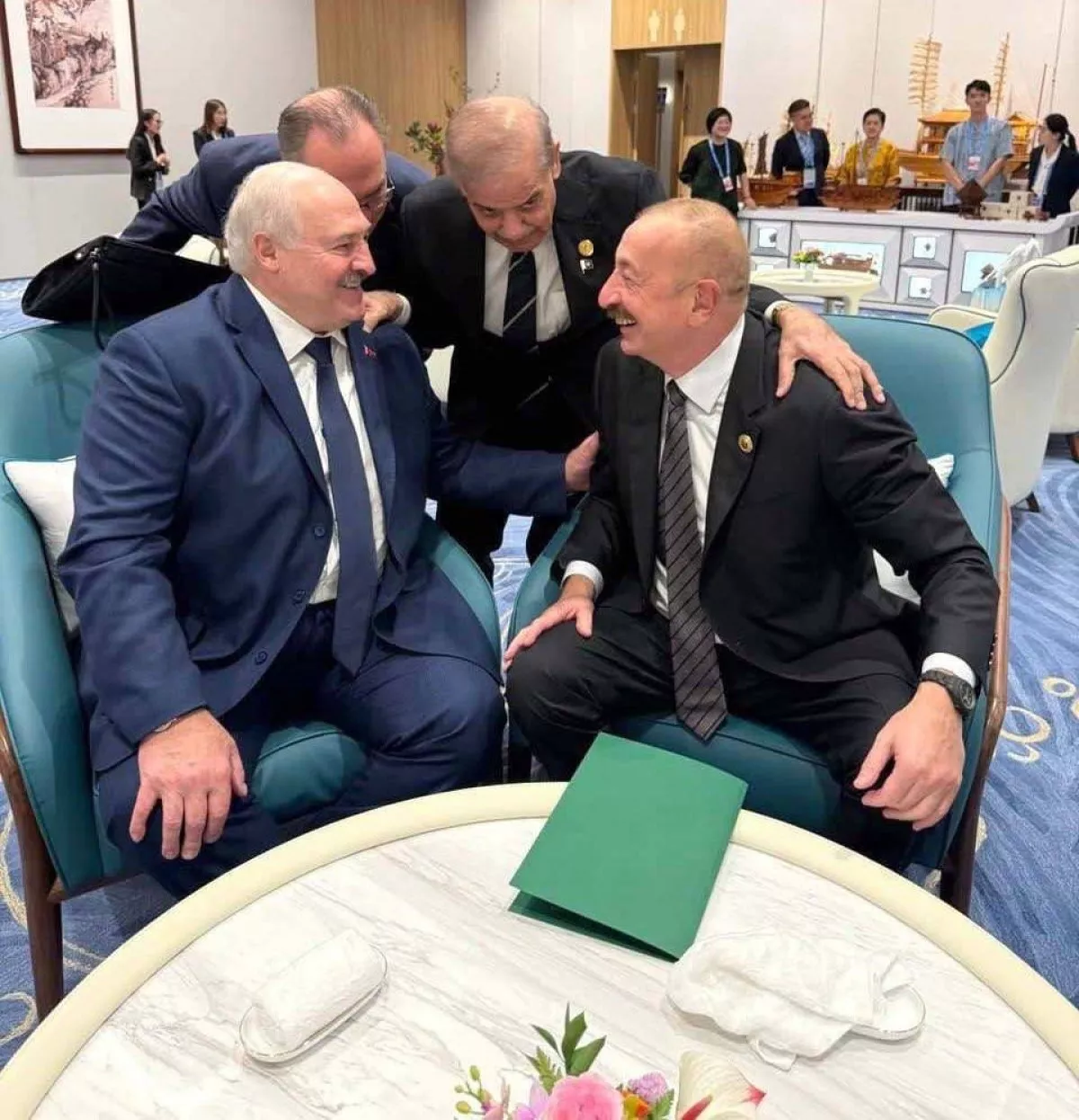
Cooperation between Azerbaijan and Belarus has been developing for many years in the economic and other spheres, largely built on the good personal relationship between Ilham Aliyev and Alexander Lukashenko. For example, Minsk is taking part in the reconstruction of the liberated territories of Karabakh, while in Ganja the production of Belarusian tractors has been established. But is the appearance of the Pakistani head of government in this “frame” a coincidence?
The close allied relations between Baku and Islamabad are well known. However, in recent times contacts between Belarus and Pakistan have also been intensifying.
Alexander Lukashenko has visited Pakistan three times — in May 2015, October 2016, and November 2024. In addition, on the sidelines of the SCO, the Belarusian president twice met with then–Pakistani Prime Minister Imran Khan — in June 2019 in Bishkek and in September 2021 in Dushanbe.
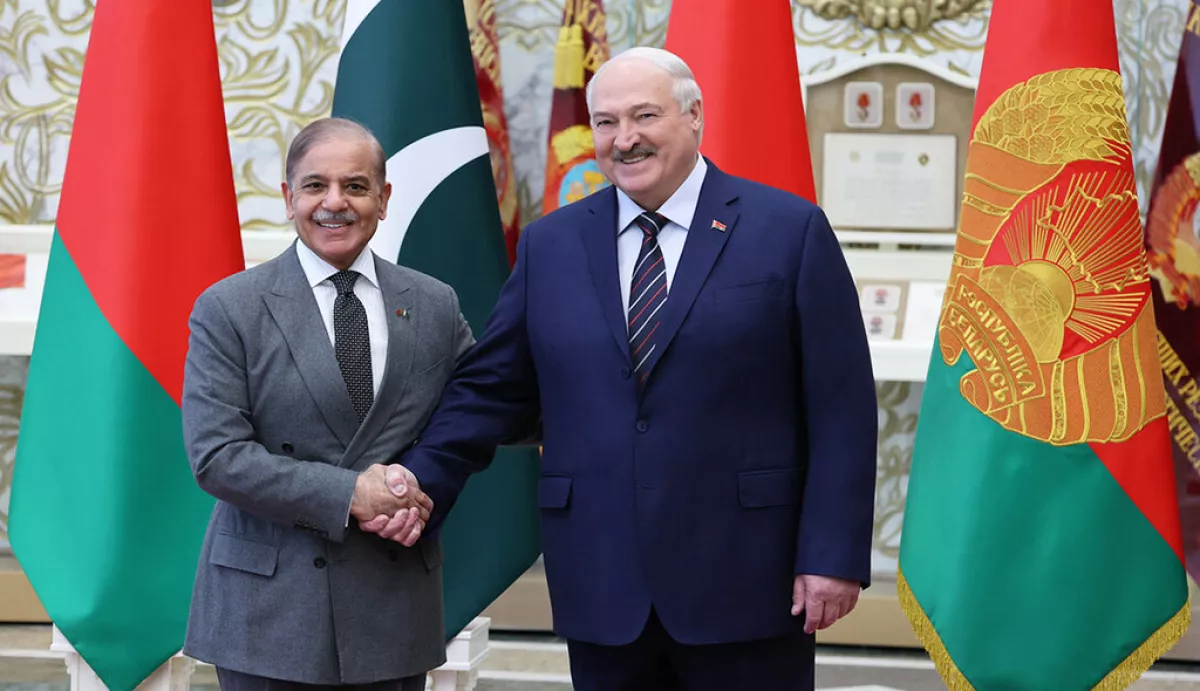
In August 2015, Pakistani Prime Minister Nawaz Sharif paid an official return visit to Belarus. Later, on 10–11 April 2025, Prime Minister Shehbaz Sharif arrived in Minsk on an official visit. He was accompanied by his elder brother, former prime minister and current president of the Pakistan Muslim League, Nawaz Sharif, as well as other family members. The first day of the visit took place in an informal setting, with a friendly, homely meeting with Alexander Lukashenko.
During the official talks between the President of Belarus and the Prime Minister of Pakistan, the discussions focused primarily on economic issues. Agreements were reached on further developing trade and economic cooperation, particularly in the industrial sector. In addition to the supply of agricultural, freight, and municipal machinery, as well as other products to Pakistan, plans were announced for the joint production of Belarusian tractors and electric buses.
Food security was declared a priority area. Alexander Lukashenko pledged to share Belarus’s expertise with Pakistani partners in the production of baby food, powdered milk, and veterinary medicines.
Shehbaz Sharif recalled that he first visited Belarus as a teenager during the Soviet era, when he travelled there with his father. Even then, the republic impressed him as a highly developed industrial country. The prime minister also invited Belarusian specialists to Pakistan to help develop agriculture, while promising in turn to send Pakistani specialists to Belarus’s textile industry — in particular, to the plant in Baranovichi.
At the Belarus–Pakistan Business Council, held at the same time, eight contracts were signed. As a result, Belarus is expected to see increased imports of rice, mandarins, pharmaceuticals, textiles, sporting goods, clothing, and footwear from Pakistan.
For its part, Belarus supplies Pakistan with potash fertilisers, tractors and spare parts, trucks, bundles of synthetic yarns and fibres, tyres, machinery, polycarboxylic acids, newsprint, and baby food. The Pakistani company Greaves Pakistan Pvt Ltd has already received a 45-tonne mining dump truck from BelAZ.
The volume of trade between the Republic of Belarus and the Islamic Republic of Pakistan fluctuates, averaging $50–65 million annually, though the growth potential is considerable. Today, there are seven bilateral Belarus–Pakistan trade and economic councils, commissions, and working groups in operation.
International and regional issues, as well as matters of humanitarian cooperation, were also discussed in Minsk. A significant number of Pakistani students are studying at Belarusian secondary specialised and higher education institutions, with applications open for the 2025/2026 academic year.
Belarusian potash against global hunger
A substantial component of Belarus’s exports to Pakistan is potash fertilisers, which are vital for the country’s agriculture. Known in Belarus as “red gold,” these fertilisers are also supplied to Azerbaijan.
Today, the fate of Belarusian potash fertilisers, which have come under Western sanctions, remains a key concern for the country’s leadership. Until 2022, Belarus accounted for up to 20% of global potash trade. However, following the sanctions of 2021–2022, including the termination of transit through Lithuania, exports in 2022 fell by 50%.
Western competitors gained significant advantages, yet the global fertiliser market still faced shortages. This led to reduced application of fertilisers, declining crop yields, and rising food prices in 2022–2023. Small farming households in the Global South were hit particularly hard.
The situation raised alarm at the United Nations. The UN Global Crisis Response Group on Food, Energy, and Finance noted at the time that fertiliser prices were rising faster than food prices. In many cases, fertilisers even became more expensive than grain, leading to a decline in production among small-scale farmers.
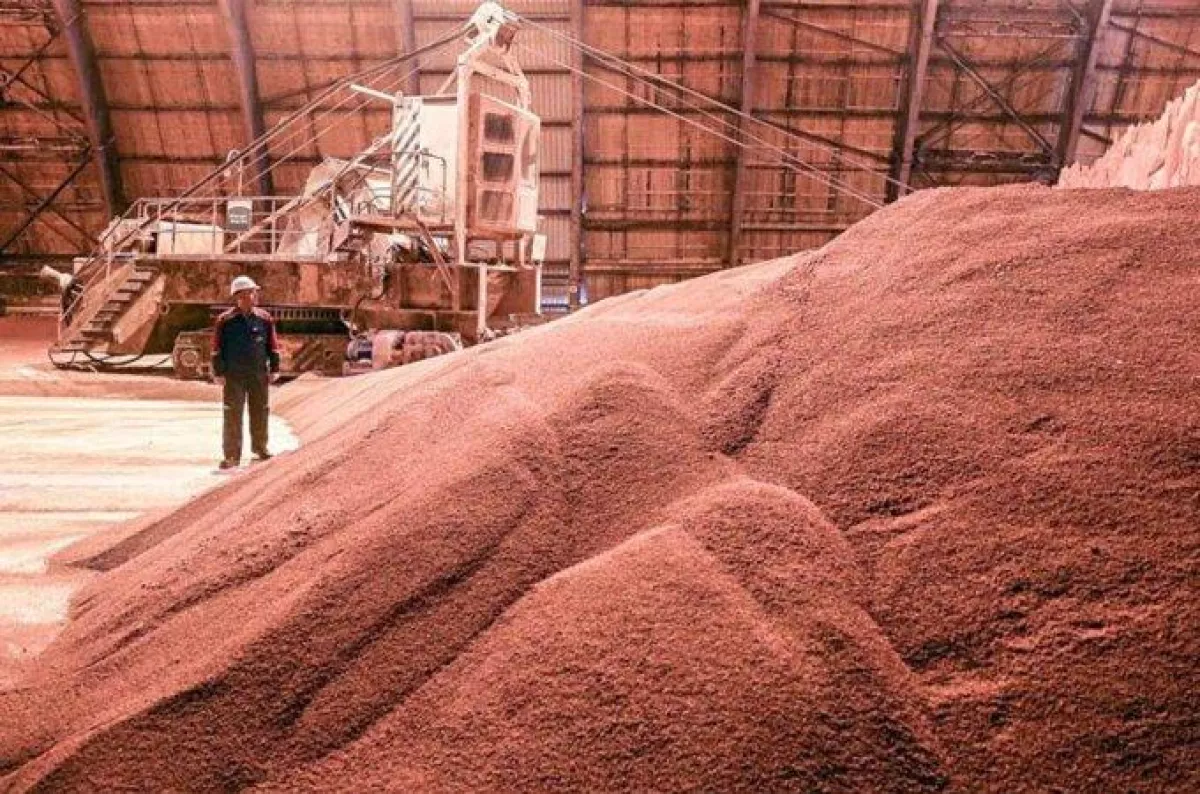
In 2022, Africa’s grain harvest fell by 16.1%. By 2023, all supplies of Belarusian potash to African countries had been completely blocked. Despite some decline in prices in 2024, the problem remains acute — especially given the projected growth of the world’s population by nearly 2 billion people over the next 30 years.
In March 2023, the UN Committee on Economic, Social and Cultural Rights recommended that Lithuania reconsider its position on Belarusian fertiliser exports to Global South countries. However, the weight and influence of the United Nations have noticeably declined in recent years.
Belarus, meanwhile, managed to find a way forward through international partners. Much of its exports were reoriented to rail shipments to China. Here Azerbaijan played a role: after being transported by rail, fertilisers were transshipped at Caspian Sea ports and then sent on to China, Vietnam, and other countries. In the first quarter of 2025, Belaruskali’s export volumes reached the level that existed prior to the imposition of sanctions.
Earlier, discussions also touched upon Minsk’s participation in the development of the China–Pakistan Economic Corridor. Belarus also has interesting logistics proposals for Pakistani producers.
At his meeting with Shehbaz Sharif in Minsk, Alexander Lukashenko said: “We are also ready to cooperate with Pakistan in terms of bringing your products to the European market. At the very least, Europeans will gladly buy your goods. They haven’t imposed sanctions against you. So please, take advantage of Belarus, which is located in the heart of Europe, to promote your products in the West.”
There is also ongoing discussion today about Donald Trump’s intention to ease sanctions on Belarusian potash, which could partially replace Canadian fertilisers on the U.S. market.
Strength for peace
Since 2018, military cooperation between Minsk and Islamabad has also been on the rise. During the Pakistani prime minister’s April visit to Minsk, an agreement on military-technical cooperation was concluded. The Belarusian State Authority for Military Industry and Pakistan’s Ministry of Defence Production signed a roadmap for 2025–2027.
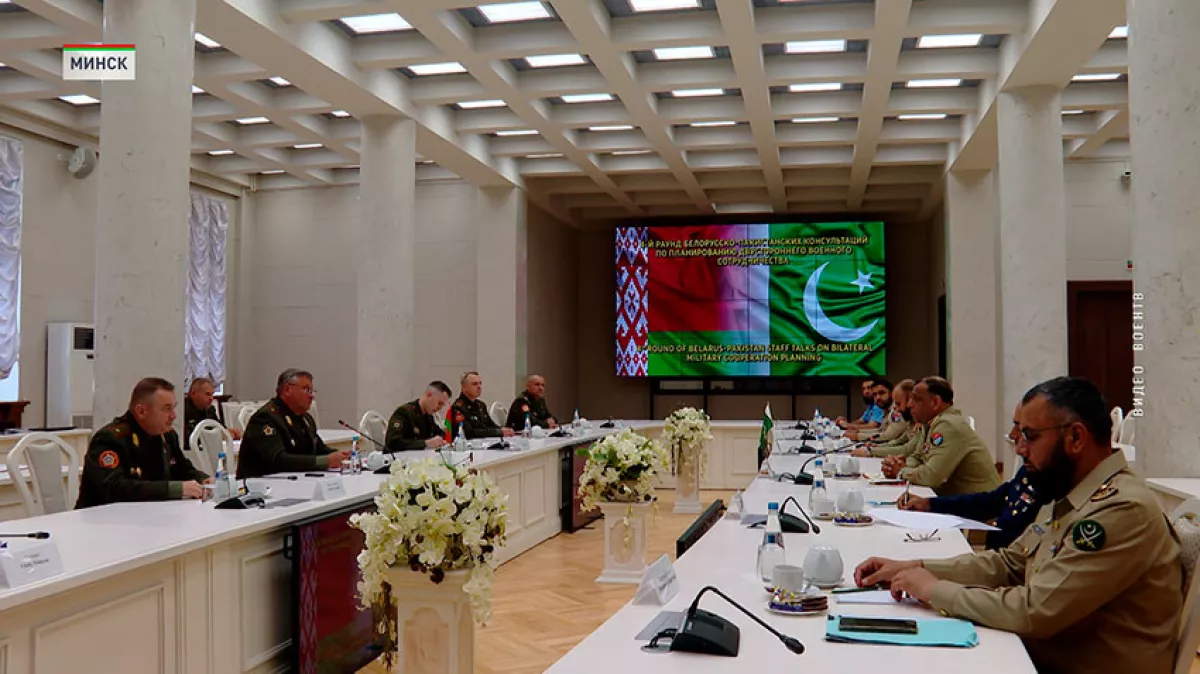
The fourth round of Belarus–Pakistan consultations on planning military cooperation took place in mid-August 2025. Belarus emphasises that its engagement with Pakistan is not linked to aggression against anyone. The Pakistani side, in turn, expressed its readiness to share experience in peacekeeping operations.
Western media note that Pakistan’s potential interest may also relate to Belarusian technologies in the fields of electronic warfare (EW) and unmanned aerial vehicles (UAVs). Indian press reports suggest that the discussions could involve Islamabad’s nuclear programme.
Earlier, in 2024, the U.S. State Department imposed sanctions on a group of Belarusian and Chinese companies allegedly supplying components for Pakistani ballistic missiles. Among them was the Minsk Wheeled Tractor Plant (MZKT), reportedly for supplying chassis for launch platforms. Washington at the time stated that the acquisition of such long-range nuclear-capable delivery systems by Pakistan would constitute a “threat” to the United States.
Some sources have also reported possible purchases by Pakistan of sights and instruments from the Belarusian Optical and Mechanical Association (BelOMO), as well as the creation of a joint group for drone development.
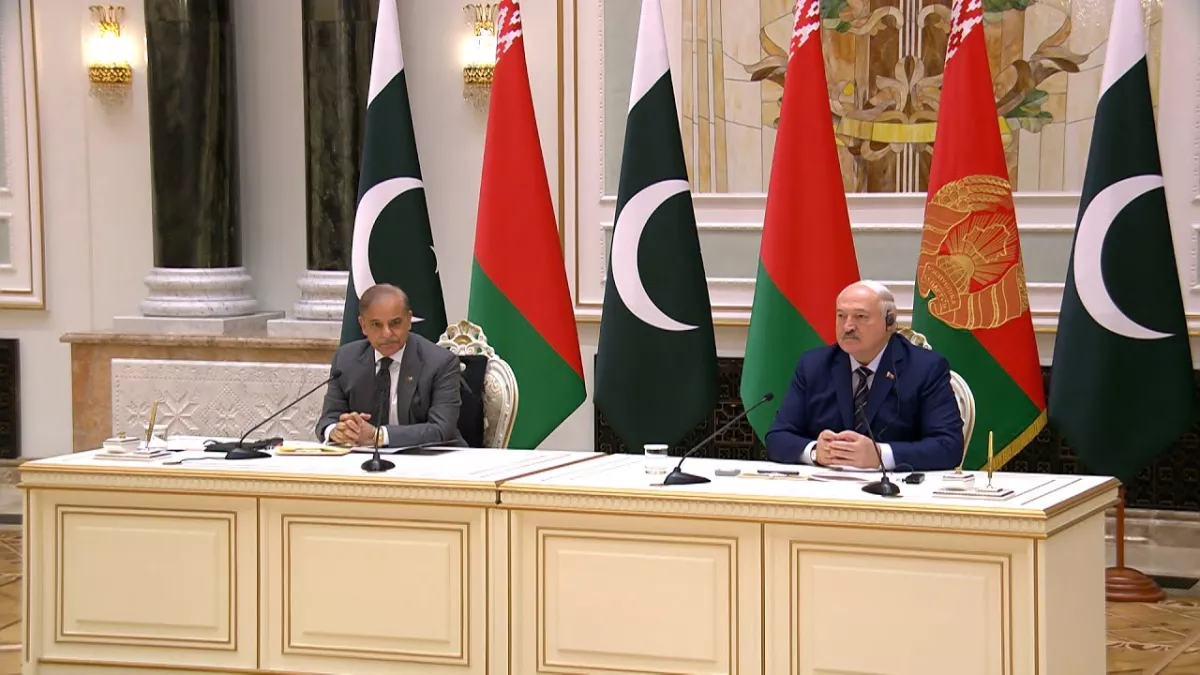
In 2025, an agreement was also signed between the interior ministries of the two countries on cooperation in combating crime. An agreement on labour migration was reached: Lukashenko proposed to accept 100,000–150,000 skilled Pakistani specialists in Belarus. Shehbaz Sharif called this “a dear gift from my brother Aleksandr Lukashenko” and emphasised that these workers “can create the very bridge we are building between Minsk and Islamabad.”
This development did not escape the attention of the entrenched Belarusian nationalist opposition in the West. Opposition channels were immediately filled with claims such as: “Thousands of militants, murderers, and rapists are being brought to Belarus,” “Belarusian women will no longer be able to walk freely,” and similar statements. However, Belarus — unlike some other countries — is not a place where interethnic discord can easily be stirred. The Belarusian Ministry of Internal Affairs issued a serious warning to all proponents of xenophobia and nationalist provocations. Following this, all racist and Islamophobic commentary online ceased immediately, along with related whispers and provocations in society. All manifestations of right-wing extremism consistently meet with a firm response in Belarus. Azerbaijanis, along with representatives of all other peoples living in the republic, feel secure.
According to experts, Minsk sees Pakistan as a key partner in South Asia — a rapidly growing region with enormous economic potential and access to markets of three billion people. For Belarus, which remains under sanctions pressure, diversifying foreign relations is a vital necessity. For Pakistan, cooperation with Belarus is important in the defence sector, technology transfer, and education.
The principles of equal and mutually beneficial cooperation, long established between Belarus and Azerbaijan and extended to relations with other countries, were highlighted by Alexander Lukashenko at the SCO summit in Tianjin as priorities for the “Shanghai family.”
The role of Azerbaijan, which has traditionally served as a bridge between different regions of Europe and Asia, becomes particularly significant and relevant in facilitating such dialogue.








